- RSS loading...
"Unknown Quantity: A Real and Imaginary History of Algebra" by John Derbyshire
Wonderful title talking about the true history of Algebra.
👤 Kris Caballero 📅 Nov 19, 2017 🗨 0 comments 📂 Book Reviews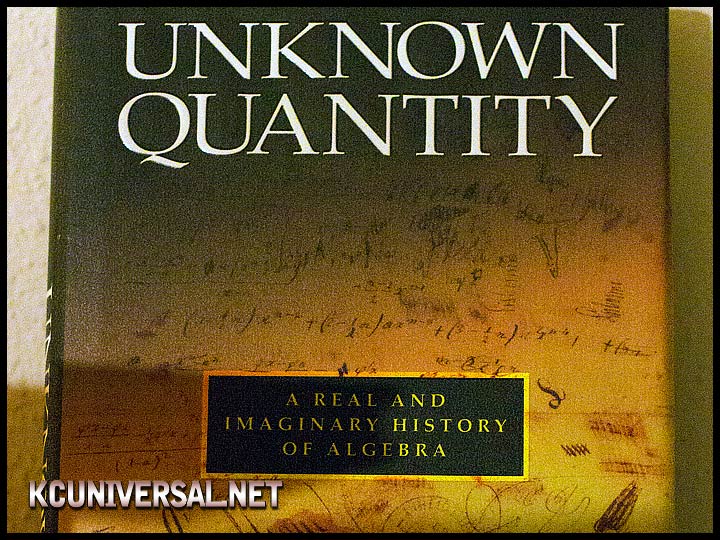
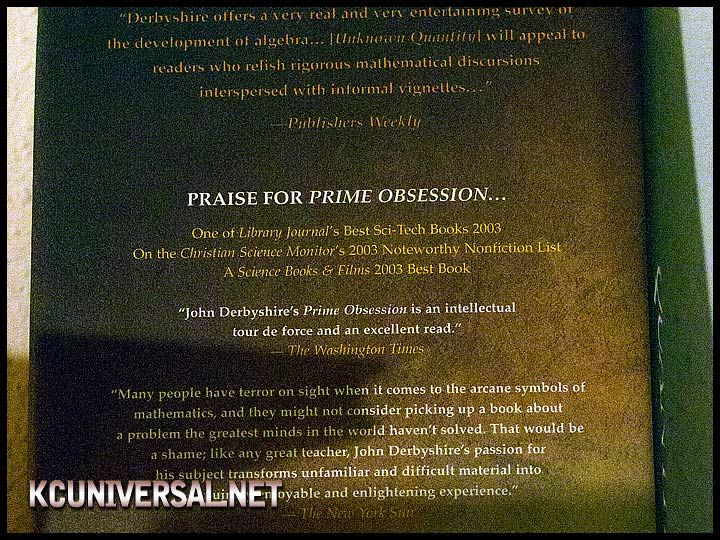
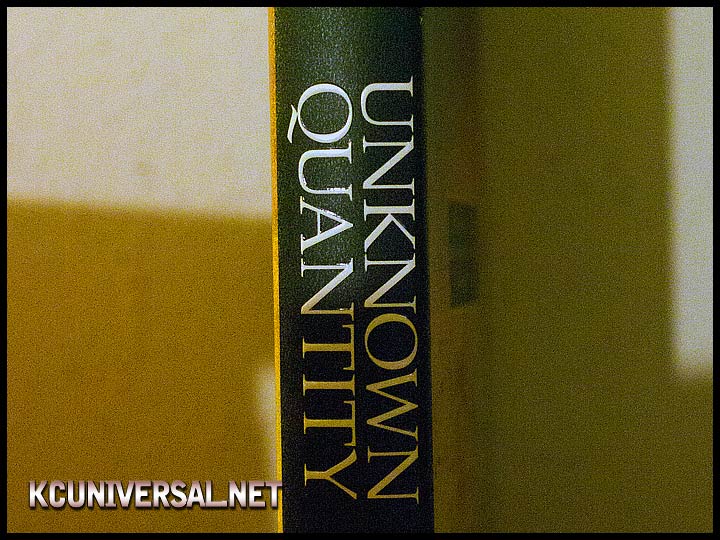
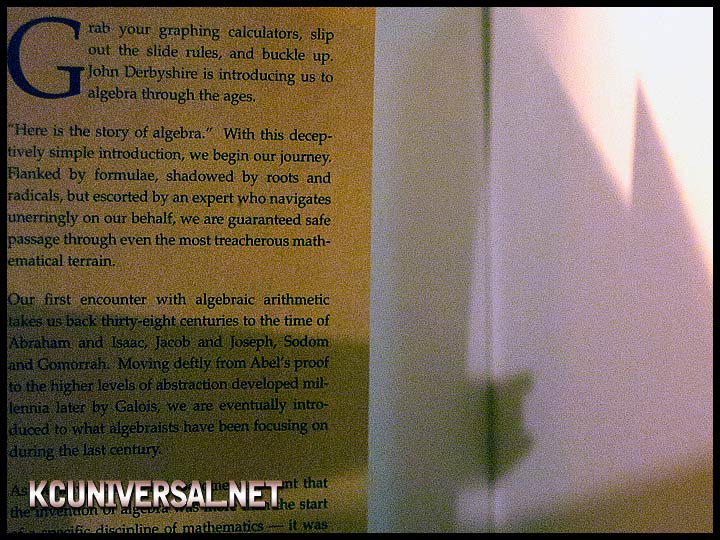
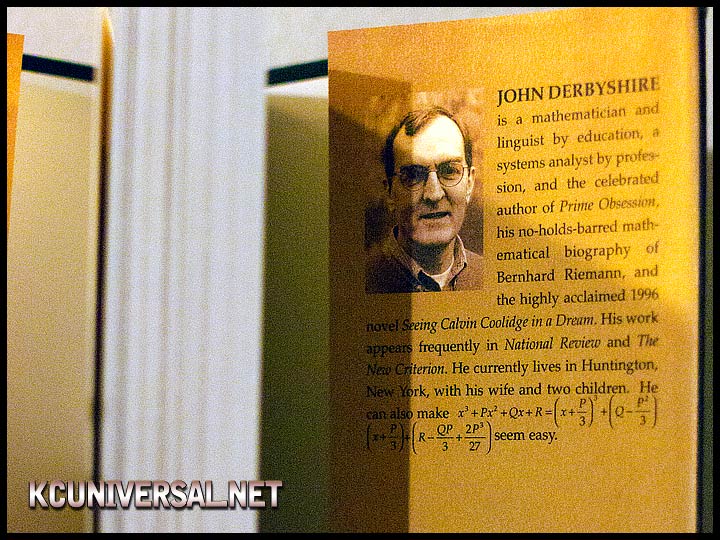
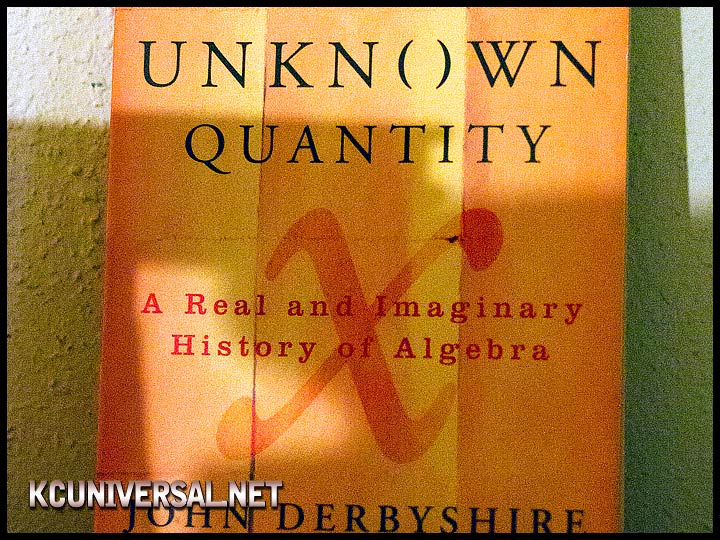
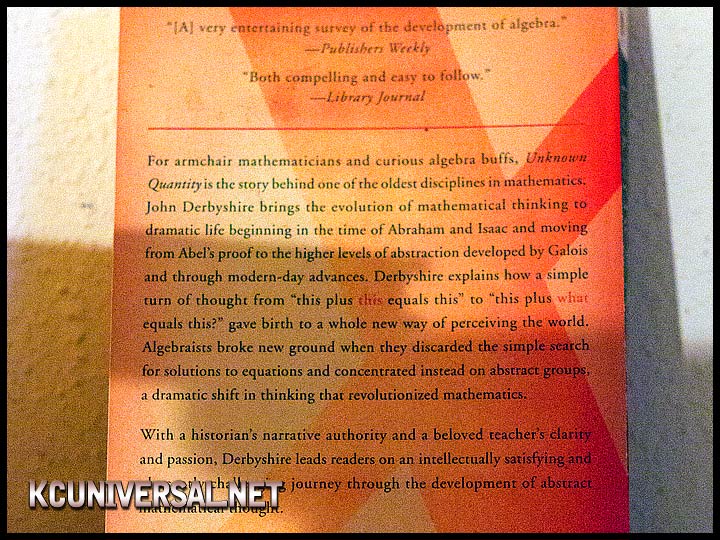
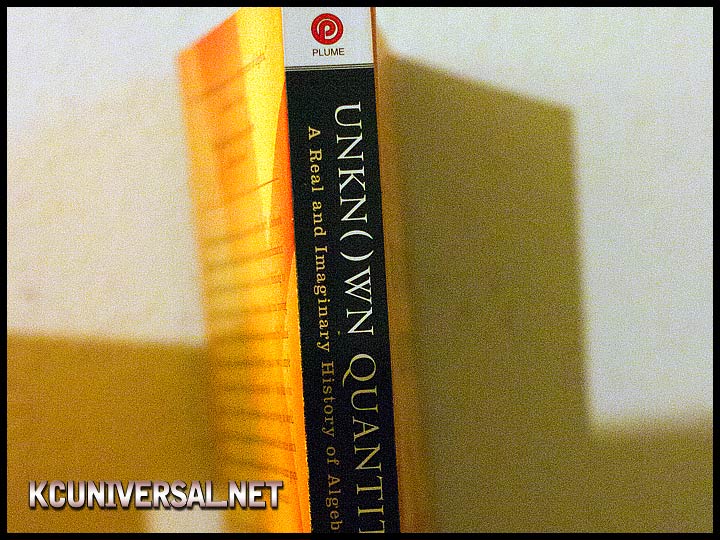
"Wow, Kris, who even has the time to read about Math History? What a pointless subject LOL."
If a subject were "pointless," then it wouldn't have been written about, published nor praised by other publications and authors who have read it, isn't that right? I still can't fathom the illustrious hate against Math, almost like people are proud to be illogical failures. I had no idea people still use "LOL," as if what they say is actually funny—it's not.
No kidding: if mathematicians like William Rowan Hamilton were lethal mobsters laying down operations to exterminate against the math-hating societies/businesses in the world, you know how many people they'd wipe off? Think about that.
All those thoughts ran through my mind when I bought this book, knowing that I'll get slammed for reading such subject. Look, I get it, I hated Math too but that didn't mean I gave up. There's a difference. Yes, everyone has their likes and dislikes, but taking it out on me for wanting to learn about it is petty. Perhaps they know I'll master a lot of the disciplines one day....yeah, I'll take that.
The discipline of Algebra is almost a must to sustain through the real world. You may not need some, but it's best if you got by. Luckily, this title written by author John Derbyshire brought us a very nice account on the history of Algebra. In fact, Algebra was your go-to and what you needed when doing big subjects like Physics. Along the way, you learn of the slow, yet determined progress and contributions to Algebra, what theories were composed, what they wanted to define the answer(s) to and quaternions. Oh, yeah, the supposed inventor/founder of Algebra? Diophantus—a Greek who went on to apply algebraic symbols to sum up mathematical word problems. Despite what other math historians have said, author Derbyshire strongly confirms this.
The amusing part of the book is Derbyshire being referred to by another writer in how much he enjoys writing about Isaac Newton. Because of his laws of gravity? More personal than that; It's about how Newton's investment in his scientific contributions that he lived and died....a virgin. I have nothing to say about that, but I can see why he loves writing about that fact—that no female beauty crossed Newton's path enough to arouse him.
Anyway, along with the other mathematical figures known for their contributions to the subject, Derbyshire includes Primers wearing his professor hat teaching the reader various studies and disciplines of Algebra. Some of them may be too advanced for the average reader, but you'll come to terms in realizing that some of these "advanced" topics fall under the discipline of Algebra. Heck, I was surprised Vectors were under uses in Algebra, via Vector Algebra (I used to think it was only part of Calculus). Along with that, you learn about Number Theory as well, being another part of Algebra. All these fascinated me knowing that, well, if you know Algebra, you know a huge chunk already.
While I can continue to rave and talk about this book, there's so much history and many figures, some popular and some not so popular, to go through. Besides my personal favorite, William Rowan Hamilton, Derbyshire's story on Alexander Grothendieck was amazing that I wished I could contact Mr. Grothendieck to interview on our website here (he passed away in 2014). Grothendieck, despite his contributions and researches, was very political to the point where his views led him to be a hermit. He really disliked government and their operations, the US and their involvement with Vietnam....it's a lot to mention. It made me so curious that I would've liked to talk to Grothendieck, even though Derbyshire says that the now-hermit refuses to be in contact with anyone in society. (Without discussing any politics here, I wonder how loud his voice would've been speaking out on the US 2016 presidential elections, especially France's ties with the climate change program.) Include Grothendieck on the list of mathematicians/physicists who were huge pacifists. Anyway, that reading was truly fascinating because I felt like I actually wanted to talk to Grothendieck, or urge Derbyshire to ask him questions.
This is about as gentle as you can get learning about the history of Algebra. With all the praises received, I wished it was a bestseller (awarding this year's 2017 Book of the Year Award is getting tougher and tougher to decide). While the Primers includes textbook-like math lessons, it's not as bad as it seems. You may even learn something new! Other than that, this is such a nice book to have and the writing doesn't bore you with inundated, big vocabulary nor is the writing dryer than Mojave Desert. Read this, and we're sure you'll come away with something. Me personally, again, the story about Grothendieck made me stay awake all night because of his views, contributions, motives and his political views. You'll likely enjoy that read too.
I strongly recommend this book a lot!
CONTENTS5/5
COVER5/5
WRITING5/5
PRICE5/5
- Perfect companion to those wanting to know the history and development of Algebra.
- Great for both students of Math History/Research and professors.
- A suggested book to help students better understand Math.
- Societal, biological, scientific and technological advances wouldn't have gotten to where we are without Math.
- None.
PROFILE |
|
|---|---|
| Title | Unknown Quantity: A Real and Imaginary History of Algebra |
| Author(s) | John Derbyshire |
| Description | [HARDCOVER - INNER FRONT FLAP] Grab your graphing calculators, slip out the slide rules, and buckle up. John Derbyshire is introducing us to algebra through the ages. "Here is the story of algebra." With this deceptively simple introduction, we begin our journey. Flanked by formulae, shadowed by roots and radicals, but escorted by an expert who navigates unerringly on our behalf, we are guaranteed safe passage through even the most treacherous mathematical terrain. Our first encounter with algebraic arithmetic takes us back thirty-eight centuries to the time of Abraham and Isaac, Jacob and Joseph, Sodom and Gomorrah. Moving deftly from Abel's proof to the higher levels of abstraction developed millennia later by Galois, we are eventually introduced to what algebraists have been focusing on during the last century. As we travel the ages, it becomes apparent that the invention of algebra was more than the start of a specific discipline of mathematics — it was also the birth of a new way of thinking that clarified both basic numeric concepts as well as our perception of the world around us. Algebraists broke new ground when they discarded the simple search for solutions to equations and concentrated instead on abstract groups, a dramatic shift in thinking that revolutionized mathematics. Written for those among us who are unencumbered by a fear of formulae, Unknown Quantity delivers on its promise to present a history of algebra. Astonishing in its bold presentation of the math and graced with narrative authority, our journey through the world of algebra is at once intellectually satisfying and pleasantly challenging. [PAPERBACK] For armchair mathematicians and curious algebra buffs, Unknown Quantity is the story behind one of the oldest disciplines in mathematics. John Derbyshire brings the evolution of mathematical thinking to dramatic life beginning in the time of Abraham and Isaac and moving from Abel's proof to the higher levels of abstraction developed by Galois and through modern-day advances. Derbyshire explains how a simple turn of thought from "this plus this equals this" to "this plus what equals this?" gave birth to a whole new way of perceiving the world. Algebraists broke new ground when they discarded the simple search for solutions to equations concentrated instead on abstract groups, a dramatic shift in thinking that revolutionized mathematics. With a historian's narrative authority and a beloved teacher's clarity and passion, Derbyshire leads readers on an intellectually satisfying and pleasantly challenging journey through the development of abstract mathematical thought. |
| Dedication | "For Rosie" |
| ISBN | 0-309-09657-X |
| Book Dimensions (Hardcover) | Width: 6.94″ (6 15/16″) |
| Height: 9.31″ (9 5/16″) | |
| Depth: 1.75″ (5¾8″) | |
| Book Dimensions (Paperback) | Width: 5.31″ (6 5/16) |
| Height: 8″ | |
| Depth: 0.75″ (¾8″) | |
| Page Count | 386 (Hardcover), 384 (Paperback) |
| Contents | Introduction, Math Primer: Numbers and Polynomials, [Part 1: The Unknown Quantity] 1 Four Thousand Years Ago, 2 The Father of Algebra, 3 Completion and Reduction, Math Primer: Cubic and Quartic Equations, 4 Commerce and Competition, 5 Relief for the Imagination, [Part 2: Universal Arithmetic] 6 The Lion's Claw, Math Primer: Roots of Unity, 7 The Assault on the Quintic, Math Primer: Vector Spaces and Algebra, 8 The Leap into the Fourth Dimension, 9 An Oblong Arrangement of Terms, 10 Victoria's Brumous Isles, [Part 3: Levels of Abstraction] Math Primer: Field Theory, 11 Pistols at Dawn, 12 Lady of the Rings, Math Primer: Algebraic Geometry, 13 Geometry Makes a Comeback, 14 Algebraic This, Algebraic That, 15 From Universal Arithmetic to Universal Algebra, Endnotes, Picture Credits, Index |
| Cover Design | Van Nguyen (Hardcover) // Lucia Kim (Paperback) |
| Author Photograph | Lynette Rose Derbyshire |
| Published | May 15, 2006 |
| Publisher | Penguin Books (www.penguin.com) |
| Copyright | © John Derbyshire 2006 |
| Printed in | United States of America |
| Book Format | Hardcover, Paperback, Kindle |
| Quoted Reviews |
"Derbyshire offers a very real and very entertaining survey of the development of algebra... [Unknown Quantity] will appeal to readers who relish rigorous mathematical discursions interspersed with informal vignettes..." — Publishers Weekly "Both compelling and easy to follow." — Library Journal "The story of algebra is the story of civilization itself. . . . Unknown Quantity buzzes with rivalries, frustrations, and breakthroughs . . . A first-rate account that even algebraphobes will struggle to fault." — New Scientist "An engaging account . . . Derbyshire has done a good job of protraying algebra and its journey toward abstraction from its roots in early civilization." — Mathematical Association of America "Talk about a Renaissance man." — National Review |
| Best Seller's List | -- |
| Other | John Derbyshire is a mathematician and linguist by education, a systems analyst by profession, and the celebrated author of Prime Obsession, his no-holds-barred mathematical biography of Bernhard Riemann, and the highly acclaimed 1996 novel Seeing Calvin Coolidge in a Dream. His work appears frequently in National Review and The New Criterion. He currently lives in Huntington, New York, with his wife and two children. He can also make x3 + Px2 + Qx + R = (x + P/3)3 + (Q - P2/3)(x + P/3) + (R - QP/3 + 2P3/27) seem easy. |
Kris Caballero
Founder of KCU Network and KCU Plus, Kris has been writing since he managed a personal blog made back in late 2005. Officially back to doing computer programming (software development) and video production, Kris enjoys reading books on Mathematics, Quantum Computing, Philosophy, playing old video/DOS games, digital video archiving, and listening to sports, public radio and classical music.
MORE BOOK REVIEWS
Comments
This policy contains information about your privacy. By posting, you are declaring that you understand this policy:
- Your name, rating, website address, town, country, state and comment will be publicly displayed if entered.
- Aside from the data entered into these form fields, other stored data about your comment will include:
- Your IP address (not displayed)
- The time/date of your submission (displayed)
- Your email address will not be shared. It is collected for only two reasons:
- Administrative purposes, should a need to contact you arise.
- To inform you of new comments, should you subscribe to receive notifications.
- A cookie may be set on your computer. This is used to remember your inputs. It will expire by itself.
This policy is subject to change at any time and without notice.
These terms and conditions contain rules about posting comments. By submitting a comment, you are declaring that you agree with these rules:
- Although the administrator will attempt to moderate comments, it is impossible for every comment to have been moderated at any given time.
- You acknowledge that all comments express the views and opinions of the original author and not those of the administrator.
- You agree not to post any material which is knowingly false, obscene, hateful, threatening, harassing or invasive of a person's privacy.
- The administrator has the right to edit, move or remove any comment for any reason and without notice.
Failure to comply with these rules may result in being banned from submitting further comments.
These terms and conditions are subject to change at any time and without notice.







![KCU Video Game Longplays: Ms. Chomp [v1.2] (PC)](http://plus.kcuniversal.net/kcu-gaming-network/kcu-video-game-longplays/pics/0011-01-ms-chomp-pc-720x405.jpg)
![KCU Video Game Longplays: Wheel of Fortune [Third Edition] (PC)](http://plus.kcuniversal.net/kcu-gaming-network/kcu-video-game-longplays/pics/0010-01-wheel-of-fortune-third-edition-pc-720x405.jpg)
![KCU Video Game Longplays: Wheel of Fortune [Second Edition] (PC)](http://plus.kcuniversal.net/kcu-gaming-network/kcu-video-game-longplays/pics/0009-01-wheel-of-fortune-second-edition-pc-720x405.jpg)
![KCU Video Game Longplays: Wheel of Fortune [First Edition] (PC)](http://plus.kcuniversal.net/kcu-gaming-network/kcu-video-game-longplays/pics/0008-01-wheel-of-fortune-first-edition-pc-720x405.jpg)



Comments